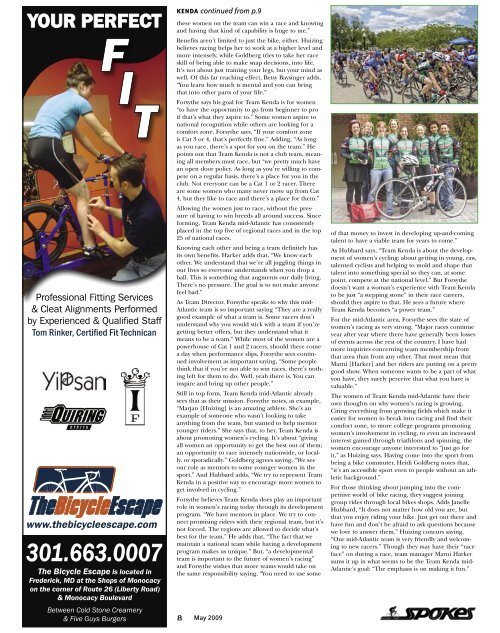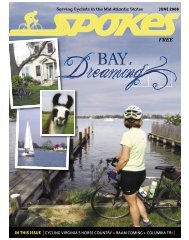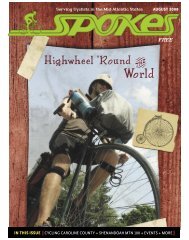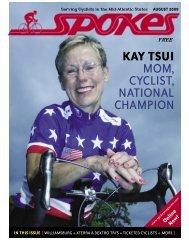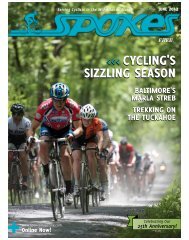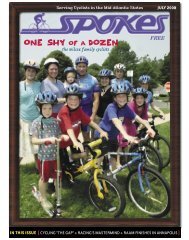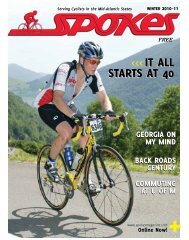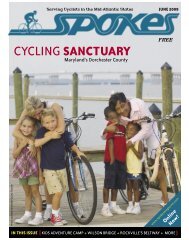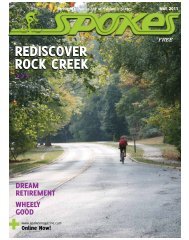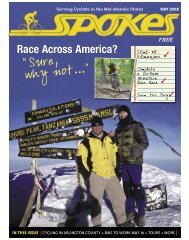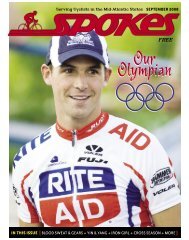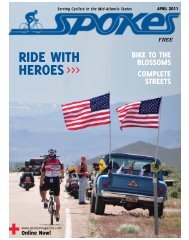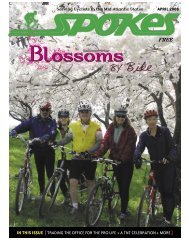THE KENDA GIRLS THE KENDA GIRLS - Spokes Magazine
THE KENDA GIRLS THE KENDA GIRLS - Spokes Magazine
THE KENDA GIRLS THE KENDA GIRLS - Spokes Magazine
Create successful ePaper yourself
Turn your PDF publications into a flip-book with our unique Google optimized e-Paper software.
301.663.0007<br />
<strong>KENDA</strong> continued from p.9<br />
these women on the team can win a race and knowing<br />
and having that kind of capability is huge to me.”<br />
Benefits aren’t limited to just the bike, either. Huizing<br />
believes racing helps her to work at a higher level and<br />
more intensely, while Goldberg tries to take her race<br />
skill of being able to make snap decisions, into life.<br />
It’s not about just training your legs, but your mind as<br />
well. Of this far reaching effect, Betsy Baysinger adds,<br />
“You learn how much is mental and you can bring<br />
that into other parts of your life.”<br />
Forsythe says his goal for Team Kenda is for women<br />
“to have the opportunity to go from beginner to pro<br />
if that’s what they aspire to.” Some women aspire to<br />
national recognition while others are looking for a<br />
comfort zone. Forsythe says, “If your comfort zone<br />
is Cat 3 or 4, that’s perfectly fine.” Adding, “As long<br />
as you race, there’s a spot for you on the team.” He<br />
points out that Team Kenda is not a club team, meaning<br />
all members must race, but “we pretty much have<br />
an open door policy. As long as you’re willing to compete<br />
on a regular basis, there’s a place for you in the<br />
club. Not everyone can be a Cat 1 or 2 racer. There<br />
are some women who many never move up from Cat<br />
4, but they like to race and there’s a place for them.”<br />
Allowing the women just to race, without the pressure<br />
of having to win breeds all around success. Since<br />
forming, Team Kenda mid-Atlantic has consistently<br />
placed in the top five of regional races and in the top<br />
25 of national races.<br />
Knowing each other and being a team definitely has<br />
its own benefits. Harker adds that, “We know each<br />
other. We understand that we’re all juggling things in<br />
our lives so everyone understands when you drop a<br />
ball. This is something that augments our daily living.<br />
There’s no pressure. The goal is to not make anyone<br />
feel bad.”<br />
As Team Director, Forsythe speaks to why this mid-<br />
Atlantic team is so important saying “They are a really<br />
good example of what a team is. Some racers don’t<br />
understand why you would stick with a team if you’re<br />
getting better offers, but they understand what it<br />
means to be a team.” While most of the women are a<br />
powerhouse of Cat 1 and 2 racers, should there come<br />
a day when performance slips, Forsythe sees continued<br />
involvement as important saying, “Some people<br />
think that if you’re not able to win races, there’s nothing<br />
left for them to do. Well, yeah there is. You can<br />
inspire and bring up other people.”<br />
Still in top form, Team Kenda mid-Atlantic already<br />
sees that as their mission. Forsythe notes, as example,<br />
“Marjan [Huizing] is an amazing athlete. She’s an<br />
example of someone who wasn’t looking to take<br />
anything from the team, but wanted to help mentor<br />
younger riders.” She says that, to her, Team Kenda is<br />
about promoting women’s cycling. It’s about “giving<br />
all women an opportunity to get the best out of them;<br />
an opportunity to race intensely nationwide, or locally,<br />
or sporadically.” Goldberg agrees saying, “We see<br />
our role as mentors to some younger women in the<br />
sport.” And Hubbard adds, “We try to represent Team<br />
Kenda in a positive way to encourage more women to<br />
get involved in cycling.”<br />
Forsythe believes Team Kenda does play an important<br />
role in women’s racing today through its development<br />
program. “We have mentors in place. We try to connect<br />
promising riders with their regional team, but it’s<br />
not forced. The regions are allowed to decide what’s<br />
best for the team.” He adds that, “The fact that we<br />
maintain a national team while having a development<br />
program makes us unique.” But, “a developmental<br />
team is important to the future of women’s racing”<br />
and Forsythe wishes that more teams would take on<br />
the same responsibility saying, “You need to use some<br />
of that money to invest in developing up-and-coming<br />
talent to have a viable team for years to come.”<br />
As Hubbard says, “Team Kenda is about the development<br />
of women’s cycling; about getting in young, raw,<br />
talented cyclists and helping to mold and shape that<br />
talent into something special so they can, at some<br />
point, compete at the national level.” But Forsythe<br />
doesn’t want a woman’s experience with Team Kenda<br />
to be just “a stepping stone” in their race careers,<br />
should they aspire to that. He sees a future where<br />
Team Kenda becomes “a power team.”<br />
For the mid-Atlantic area, Forsythe sees the state of<br />
women’s racing as very strong. “Major races continue<br />
year after year where there have generally been losses<br />
of events across the rest of the country. I have had<br />
more inquiries concerning team membership from<br />
that area than from any other. That must mean that<br />
Marni [Harker] and her riders are putting on a pretty<br />
good show. When someone wants to be a part of what<br />
you have, they surely perceive that what you have is<br />
valuable.”<br />
The women of Team Kenda mid-Atlantic have their<br />
own thoughts on why women’s racing is growing.<br />
Citing everything from growing fields which make it<br />
easier for women to break into racing and find their<br />
comfort zone, to more college programs promoting<br />
women’s involvement in cycling, to even an increased<br />
interest gained through triathlons and spinning, the<br />
women encourage anyone interested to “just go for<br />
it,” as Huizing says. Having come into the sport from<br />
being a bike commuter, Heidi Goldberg notes that,<br />
“it’s an accessible sport even to people without an athletic<br />
background.”<br />
For those thinking about jumping into the competitive<br />
world of bike racing, they suggest joining<br />
group rides through local bikes shops. Adds Janelle<br />
Hubbard, “It does not matter how old you are, but<br />
that you enjoy riding your bike. Just get out there and<br />
have fun and don’t be afraid to ask questions because<br />
we love to answer them.” Huizing concurs saying,<br />
“Our mid-Atlantic team is very friendly and welcoming<br />
to new racers.” Though they may have their “race<br />
face” on during a race, team manager Marni Harker<br />
sums it up in what seems to be the Team Kenda mid-<br />
Atlantic’s goal: “The emphasis is on making it fun.”<br />
8 May 2009<br />
8 May 2009


